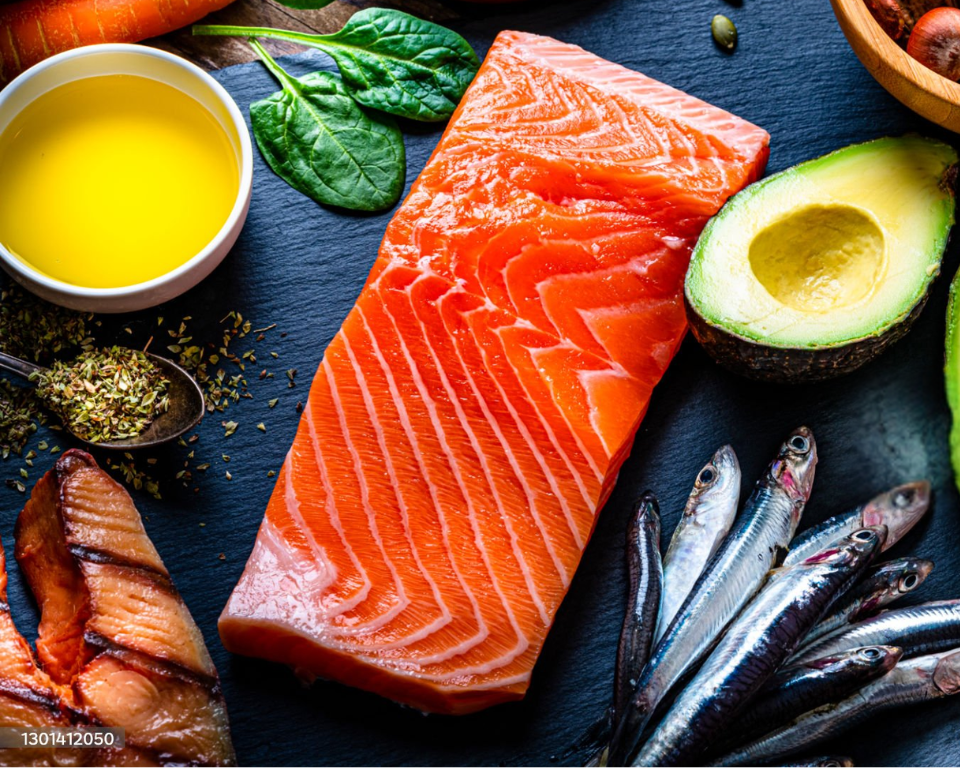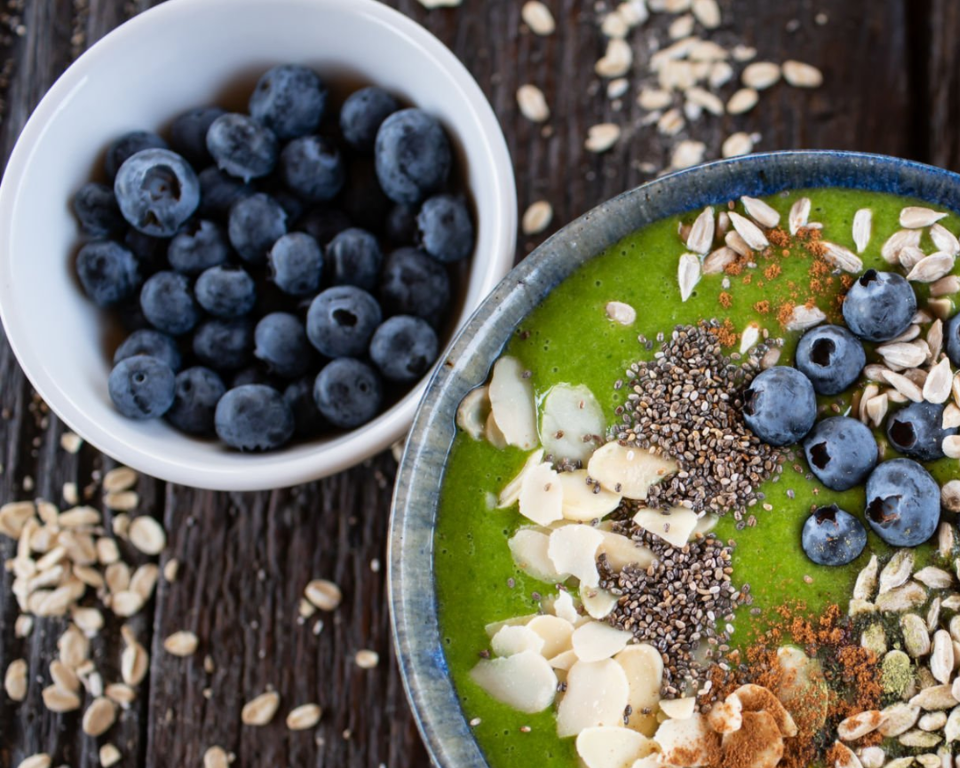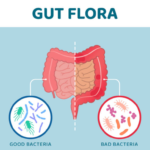
Healthy Fats Gut Health: Are They Your Microbiome’s Best Friend?
Key Takeaways About Healthy Fats and Gut Health
- Healthy fats like omega-3s and MCTs actively promote beneficial gut bacteria growth
- Precisely weighing fat portions ensures optimal gut microbiome balance
- Different fat types have varying effects on gut bacteria—some beneficial, some harmful
- The gut microbiome responds differently to plant-based vs. animal-based fats
- Tracking fat macros can help personalize your approach to gut health optimization
- Combining healthy fats with fiber creates a synergistic effect for gut health
The Gut Microbiome and Healthy Fats Connection
Your gut houses trillions of microorganisms that significantly impact your overall health. These microbes influence everything from digestion and immunity to mood and metabolism. Many don’t realize how profoundly dietary fats affect this internal ecosystem.
When you consume healthy fats, they don’t just provide energy—they interact with your gut bacteria in ways that can either promote health or contribute to disease. Research published in the Journal of Nutritional Biochemistry found that certain fats serve as prebiotics, nourishing beneficial bacteria like Akkermansia muciniphila, which helps maintain gut barrier integrity.
The quality and quantity of healthy fats matter tremendously for gut health. Precisely weighing your fat intake ensures you’re getting enough to support gut health without excess that could promote inflammation. This precision approach aligns with research showing that balanced fat consumption—neither too high nor too low—optimizes gut bacterial diversity.
For those tracking macros, understanding that healthy fats aren’t just calories but active participants in gut health can revolutionize your approach to nutrition. By weighing ingredients and monitoring your fat intake, you gain control over one of the most powerful influences on your gut microbiome.
Healthy Fats and Their Impact on Gut Health
| Fat Type | Effect on Gut Microbiome | Recommended Daily Intake | Best Food Sources |
|---|---|---|---|
| Omega-3 Fatty Acids | Increases Bifidobacterium and reduces inflammatory bacteria | 1.1-1.6g (precisely weighed) | Fatty fish, flaxseeds, walnuts |
| Medium-Chain Triglycerides (MCTs) | Promotes beneficial Lactobacillus and improves gut barrier function | 5-10g | Coconut oil, MCT oil |
| Monounsaturated Fats | Enhances microbial diversity and butyrate production | 15-20% of total calories | Olive oil, avocados, nuts |
| Saturated Fats | Mixed effects; some types may increase harmful bacteria | Limit to <10% of total calories | Butter, cheese, fatty meats |
| Trans Fats | Reduces beneficial bacteria and increases gut inflammation | Avoid completely | Processed foods, some margarines |
Omega-3 Fatty Acids: The Gut Health Champion
Omega-3 fatty acids stand out as particularly beneficial for gut health. A 2021 study in the Journal of Clinical Investigation found that participants who consumed 3 grams of omega-3s daily for 8 weeks showed a 15% increase in beneficial Bifidobacterium and a significant reduction in inflammatory markers.
When tracking macros for gut health, prioritizing omega-3s within your fat allowance can yield substantial gut health benefits. Precisely weighing fish portions or measuring flaxseed oil ensures you’re getting the optimal amount for microbiome support.
MCTs: Quick Energy, Big Gut Health Benefits
Medium-chain triglycerides (MCTs) offer unique advantages for gut health. Unlike longer-chain fats, MCTs are rapidly absorbed and can directly nourish beneficial gut bacteria. Research from the University of California found that MCT supplementation increased Lactobacillus populations by up to 30% in study participants.
Incorporating measured amounts of MCT oil into morning coffee or smoothies for those tracking macros provides gut health benefits without excessive calorie intake. Precision in measurement is key—too much can cause digestive discomfort, while too little may not provide therapeutic benefits.
See also: Can Emotions Impact Your Gut?
 How Healthy Fats Digestion Influences Gut Health
How Healthy Fats Digestion Influences Gut Health
The way your body processes healthy fats plays a crucial role in gut health. Fat digestion begins in the mouth with lingual lipase and continues in the small intestine, where bile acids emulsify fats for absorption. This process directly impacts your gut microbiome in several ways.
First, bile acids themselves act as signaling molecules that influence bacterial growth. Research from the University of Chicago demonstrated that bile acids can inhibit certain harmful bacteria while promoting beneficial ones. Consuming an appropriate amount of healthy fat—measured precisely through weighing—optimizes bile acid production.
Second, the byproducts of fat metabolism serve as food for specific gut bacteria. For example, when you consume omega-3 fatty acids, certain gut bacteria transform them into anti-inflammatory compounds that benefit the gut lining. This process works best when fat intake is balanced and consistent, highlighting the importance of tracking macros for gut health.
For those who weigh their food, understanding that fat digestion varies based on the food matrix is essential. Fats consumed with fiber digest more slowly, allowing for better interaction with gut bacteria throughout the digestive tract. This is why combining healthy fats with high-fiber foods creates a synergistic effect for gut health.
Balancing Healthy Fats for Optimal Gut Microbiome
Finding the right balance of healthy fats in your diet is essential for nurturing a healthy gut microbiome. While low-fat diets were once popular, research now shows that moderate fat intake—emphasizing quality—better supports gut bacterial diversity.
The Precision Approach to Healthy Fat Consumption for Gut Health
When tracking macros for gut health, precision matters. Studies show that the gut microbiome responds differently to varying levels of fat intake:
- Too low (under 20% of calories): May reduce beneficial bacteria that thrive on fat metabolites
- Optimal (25-35% of calories): Supports diverse microbiome and balanced bile acid production
- Too high (over 40% of calories): Can promote inflammation and reduce beneficial bacteria
You can find your optimal gut health range by weighing your food and tracking fat intake. This precision approach allows you to adjust based on your body’s response, which may differ from general recommendations.
Timing Healthy Fat Consumption for Gut Health Benefits
Interestingly, when you consume healthy fats, they can be almost as important as the fats you choose for gut health. Research published in Cell Metabolism found that fat consumption timed with the body’s circadian rhythm optimizes its interaction with gut bacteria.
For those tracking macros for gut health, consider these timing strategies:
- Morning: Include MCTs for quick energy and early gut support
- Midday: Incorporate monounsaturated fats to sustain energy and feed beneficial bacteria
- Evening: Focus on omega-3s to support overnight repair and reduce inflammation
This timed approach, combined with precise measurement through food weighing, maximizes the gut health benefits of your fat intake.
See also: Does Where You Live Affect Gut Health?
Practical Tips for Adding Gut-Healthy Fats to Your Diet

Transforming your gut health through healthy fat consumption doesn’t have to be complicated. Here are practical strategies for incorporating gut-friendly fats into your diet while maintaining precision in your macro tracking:
- Start your day with measured healthy fat: Add 1 tablespoon (14g) of MCT oil to your morning coffee or tea for quick energy and gut support.
- Upgrade your cooking oils for gut health: Replace inflammatory oils with measured amounts of extra virgin olive or avocado oil—both support beneficial gut bacteria.
- Include fatty fish twice weekly for gut microbiome: A precisely weighed 4-ounce (113g) portion of salmon provides optimal omega-3s for gut health.
- Add avocado to meals for gut bacteria: Half an avocado (approximately 68g) provides monounsaturated fats that feed beneficial gut bacteria.
- Incorporate nuts and seeds for gut health: A 1-ounce (28g) portion of walnuts or flaxseeds adds gut-supporting fats and fiber.
- Try fat-based dressings for gut benefits: Make homemade dressings with olive oil, measuring precisely to control portion size while supporting gut health.
- Consider fat quality for microbiome health: When possible, choose grass-fed, organic sources, as they contain more beneficial fatty acids for gut health.
By weighing these portions precisely, you ensure you get enough healthy fat to support gut health without exceeding your macro targets. This precision approach allows you to optimize your gut microbiome while controlling your overall nutrition.
Common Myths About Healthy Fats and Gut Health
Despite growing evidence supporting the role of healthy fats in gut health, several myths persist. Let’s address these misconceptions with evidence-based information:
Myth 1: All dietary fat is harmful to gut bacteria
Reality: Research from the American Gut Project shows that certain fats, particularly omega-3s and monounsaturated fats, actively promote the growth of beneficial gut bacteria. Only trans fats and excessive saturated fats negatively impact gut health.
Myth 2: A low-fat diet is best for gut health
Reality: Studies published in the British Journal of Nutrition demonstrate that extremely low-fat diets can reduce microbial diversity. Moderate fat intake (25-35% of calories) better supports a balanced gut microbiome.
Myth 3: You can’t be precise with fat portions for gut health
Reality: Using digital food scales allows for accurate measurement of fat-containing foods, enabling precise macro tracking. This precision helps optimize fat intake for gut health benefits.
Myth 4: Plant and animal fats affect the gut similarly
Reality: Research from the University of California, San Francisco, shows that plant-based fats tend to promote more beneficial bacteria compared to most animal fats, except omega-3-rich fish oils.
Understanding these realities helps you make informed decisions about including healthy fats in your diet for optimal gut health.
See also: Is Your Gut Health and Eye Health Connected?
Measuring Success: How to Tell If Healthy Fats Are Helping Your Gut Health
It’s important to track progress when incorporating healthy fats into your diet for gut health. Here are reliable indicators that your approach is working:
- Improved digestion: Regular bowel movements with reduced bloating and gas
- Enhanced energy levels: Steady energy throughout the day without crashes
- Reduced inflammation: Decreased joint pain and skin issues
- Better mood stability: Improved mental clarity and emotional balance
- Improved lab markers: Lower inflammatory markers in blood tests
For those who weigh food and track macros, keeping a journal that correlates fat intake with these symptoms can reveal personal patterns and optimal fat levels for your unique gut microbiome health.
Remember that gut health changes take time—typically 4-6 weeks of consistent dietary patterns before significant microbiome shifts occur. Patience and precision in your approach will yield the best results for your gut health journey.
Source Links
- Journal of Nutritional Biochemistry: Dietary Fat and Gut Microbiota
- Cell Metabolism: Circadian Rhythm and Fat Metabolism
- American Gut Project: Fat Consumption Patterns and Microbiome Diversity
- British Journal of Nutrition: Low-Fat Diets and Microbial Changes
- University of California: MCT Effects on Gut Bacteria
- Journal of Clinical Investigation: Omega-3 Supplementation and Gut Health
- University of Chicago: Bile Acids as Signaling Molecules in the Gut













































Post Comment